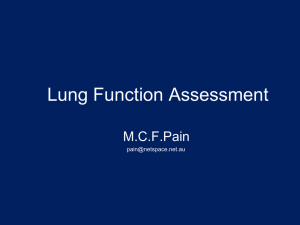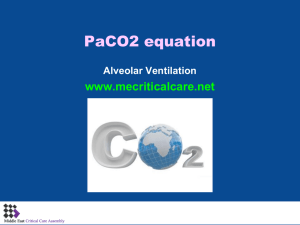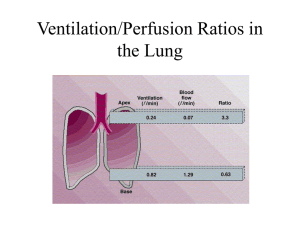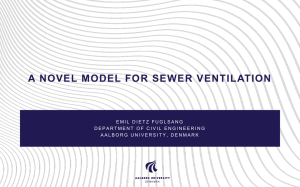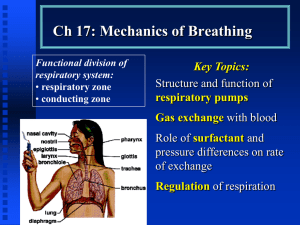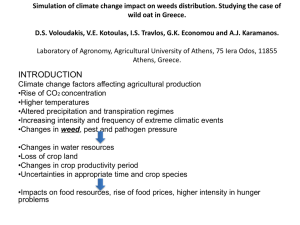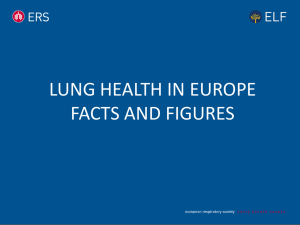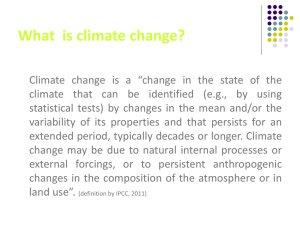Diapositiva 1
advertisement
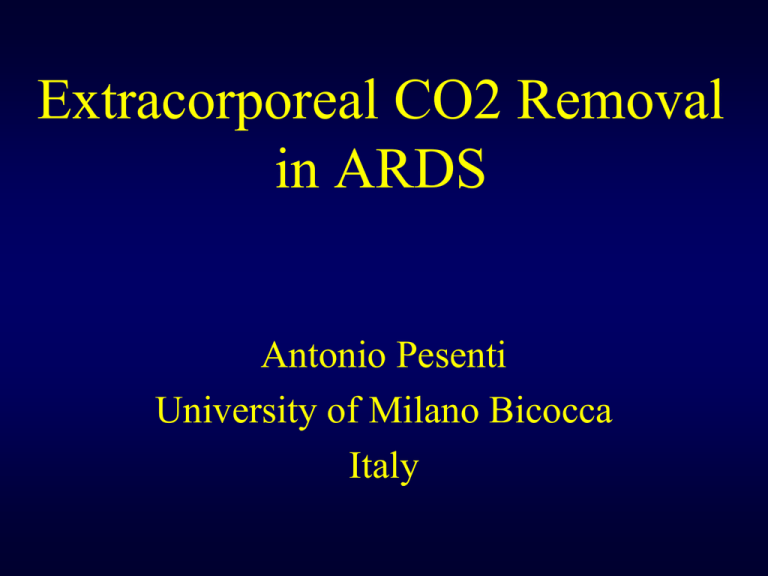
Extracorporeal CO2 Removal in ARDS Antonio Pesenti University of Milano Bicocca Italy HISTORY First RCT on ECMO in ARDS. No MV protocol during ECMO, only a generic indication of reducing inspiratory pressure and FiO2 Adult respiratory distress syndrome (ARDS): why did ECMO fail? Kolobow T, et al Int J Artif Organs. 1981 ;4:58 • We believe severely diseased lungs have a chance to heal only if the environment remains conducive to the healing of the lung. • This environment does not consist of high airway pressures, high tidal volumes, high PEEP, high FiO2…….. Artificial Lung From Oxygenators: Buying time with artificial lungs Zapol WM, Kits RJ, NEJM 1972; 286 (12) To Artificial lungs: Resting the lung Gattinoni L 1976? Personal Communication NEJM 2000; 342:1301 SPECIFIC HYPERVENTILATION FRC VE (L/min) RATIO NORMAL 2500 <7 < 2.8 ARDS 1000 > 15 > 15 100 VA (control) VA (actual) X 100 MECH. VENTILATION THEORETICAL SPONT. VENTILATION 50 0 50 VCO2 (CDML) VCO2 (Total) 100 X 100 Extracorporeal CO2 removal • Reducing ventilation anywhere down to 0 according to the proportion of VCO2 removed • No ventilation , no VILI OXYGENATION FiO2 =1.0 250 mL min-1 7000 mL min-1 PBF Hb 15 g Satv 82% PvO2 47 mmHg CO2 cont 52 mL PvCO2 43 mmHg Sata 98% PaO2 110 mmHg VO2 250 mL min-1 CO2 REMOVAL VA 9500 mL min-1 1100 mL min-1 PBF CO2 cont 34 mL PaCO2 15 mmHg VCO2 200 mL min-1 Gattinoni et al., International Anesthesiology Clinics, 1983; 21: 97-117 The technique seems to prevent the pulmonary barotrauma and extrapulmonary derangements caused by conventional mechanical ventilation LFPPV ECCO2R IN SEVERE ACUTE RESPIRATORY FAILURE GATTINONI et al: JAMA 1986 ECMO CRITERIA + TSLC < 30 cmH2O 43 patients 21 survivors (49%) Mean by-pass length: Survivors 5.4 ± 3.5 days NonSurvivors 10.6 ± 6.6 days Bleeding: 1800 ± 500 ml/day Pumpless extracorporeal lung assist and adult respiratory distress syndrome Reng M et al., The Lancet 2000; 356 (15) Total extracorporeal arteriovenous carbon dioxide removal in ARF: a phase I clinical study Conrad S et al. ICM 2001; 27: 1340 8 patients 72 hr AVCO2R PaCO2 VE FROM 90.8 ± 7.5 6.92 ± 1.6 TO 51.8 ± 3.1 3.0 ± 0.53 Critical Care 2006, 10:R151 PaCO2 (mmHg) Arterial pH 7.5 90 * 80 70 7.4 * * * 60 * 7.3 * * 7.2 50 7.1 40 7.0 30 baseline T0 T24 T48 T72 baseline T0 Anesthesiology. 2009 ;111: 826 T24 T48 T72 * TIME TO HEAL Arteriovenous extracorporeal respiratory support Implementation Vv ILA with a pump The A Lung PALP System Extracorporeal CO2 Removal Physiological Side Effects • Decreased PA O2: ( Due to decreased QR) • Decreased TV - Decrecruitment – Higher PEEP equal Paw • Ineffective Coughing ( ?) Marcolin R et al Trans Am Soc Artif Intern Organs 1986 Marcolin R et al Trans Am Soc Artif Intern Organs 1986 Marcolin R et al: Trans Am Soc Artif Intern Organs 1986 What influences the respiratory drive in COPD pts undergoing PECOR? 35 EAdi peak (μV) 30 4 25 R² = 0.9107 20 3 15 2 1 10 1) 2) 3) 4) 5 0 7.3 GF 10 L/min, VCO2ML 134 mL/min GF 5 L/min, VCO2ML 108 mL/min GF 2.5 L/min, VCO2ML 83 mL/min GF 0 L/min, VCO2ML 0 mL/min 7.32 7.34 7.36 Arterial pH 7.38 7.4 7.42 What influences the respiratory drive in COPD pts undergoing PECOR? 35 1) 2) 3) 4) EAdi peak (μV) 30 25 GF 10 L/min, VCO2ML 134 mL/min GF 5 L/min, VCO2ML 108 mL/min GF 2.5 L/min, VCO2ML 83 mL/min GF 0 L/min, VCO2ML 0 mL/min 20 4 3 2 15 1 10 R² = 0.96 5 0 40 45 50 55 PaCO2 (mmHg) 60 65 100 80 60 40 VCO2 Natural Lung % 20 VCO2 Membrane Lung % 0 6 4 2 0,4 Gas Flow Membrane Lung (l/min) What influences the respiratory drive in ARDS pts undergoing ECMO? 25 R² = 0.1906 EAdi peak (μV) 20 15 10 5 0 30.0 35.0 40.0 45.0 PaCO2 (mmHg) 50.0 55.0 Extracorporeal CO2 Removal Physiological Side Effects • Decreased PA O2: ( Due to decreased QR) • Decreased TV - Decrecruitment – Higher PEEP Maintain Paw • Ineffective Coughing ( ?) PAO2= FiO2 *713 - ( PaCO2/R) FiO2 1 PACO2 = 35 mmHg PAO2 300 mmHg 0.5 PAO2 200 mmHg PAO2 100 mmHg AIR 0 0 0.5 1 R Cereda M et al. Chest 1996; 109: 480 FUTURE VILI PREVENTION: THE IDEAL TOOL • • • • • Peripheral low flow cannulation 250-500 ml/ min blood flow 50-80 % total CO2 production Regional anticoagulation Simple Safe circuitry ( CVVH) Zanella A et al Total CO2 elimination by a membrane lung 200 Δ 69% 180 160 VCO2 (ml/min) Δ 27% 140 Δ18% 120 100 80 60 VCO2 standard conditions 40 VCO2 ALCOR 20 0 0 1 2 3 4 Acid infusion (mmol/min) 5 6 ECLA: different techniques for different goals 1. Rescue of most severe hypoxemia – ARDS 2. Hyper protective ventilation – ARDS 3. Alternative to invasive ventilation – ARDS, COPD Extracorporeal lung Assist 3 ALTERNATIVE TO VENTILATION 1. BLOOD FLOW UNDEFINED 2. SOUND PATHOPHYSIOLOGY The three evils of MECHANICAL VENTILATION • VILI • VAP • SEDATION Extracorporeal support rationale “... the best therapeutic strategy, to reduce the risk of new pneumothoraces and to stop the air leak, would be to dispense with mechanical ventilation or any form of positive airway pressure. Spontaneous breathing could be maintained by supplementing the spontaneous CO2 clearance with partial extracorporeal CO2 removal.” Pesenti A., et al: Percutaneous Extracorporeal CO2 Removal in a Patient with Bullous Emphysema with Recurrent Bilateral Pneumothoraces and Respiratory Failure. Anesthesiology 1990; 72: 571-573
